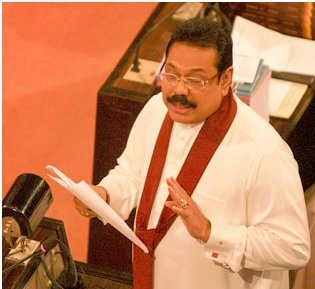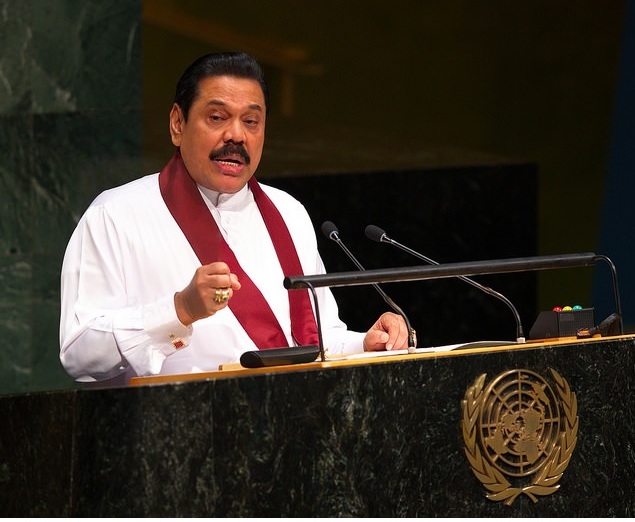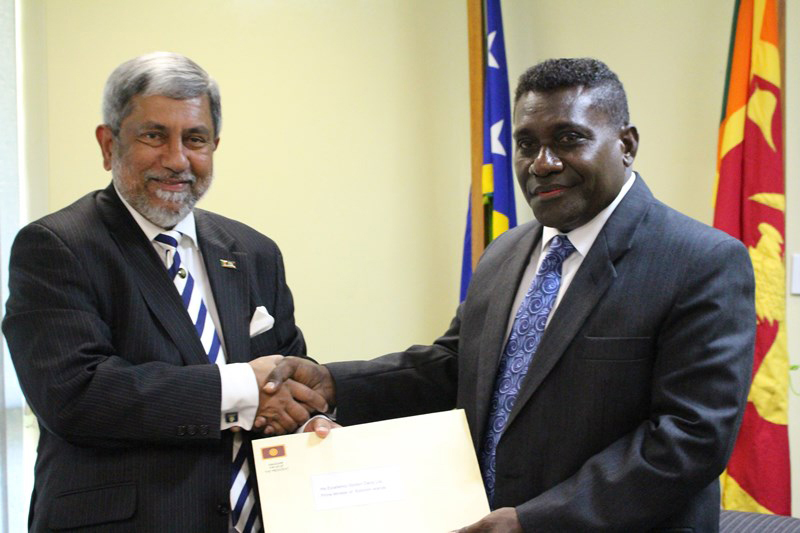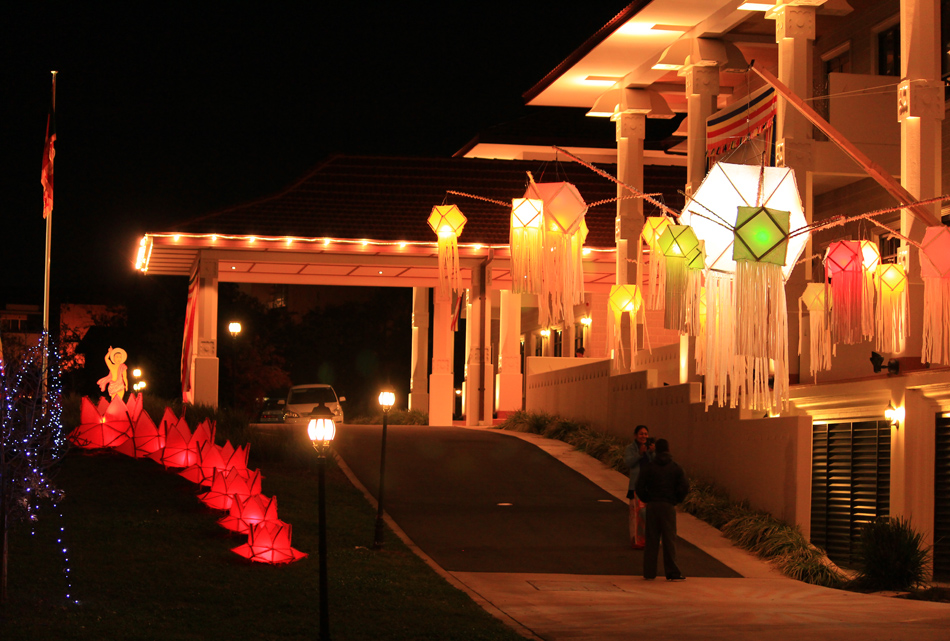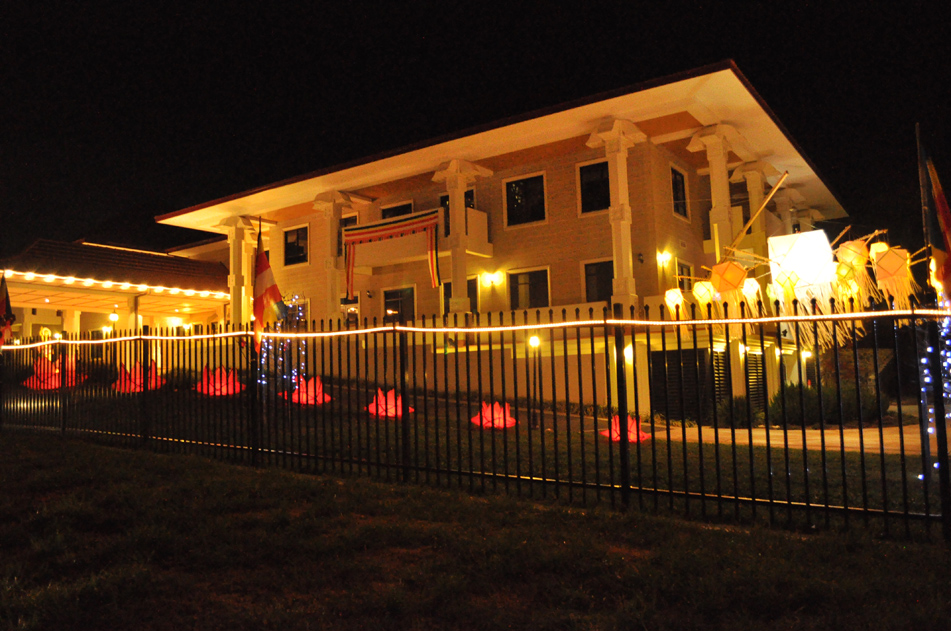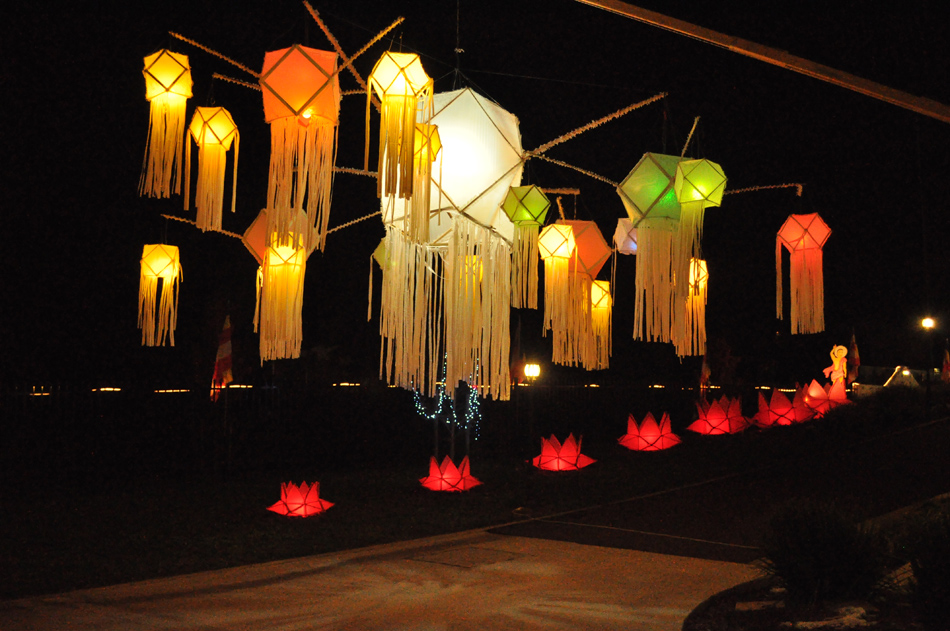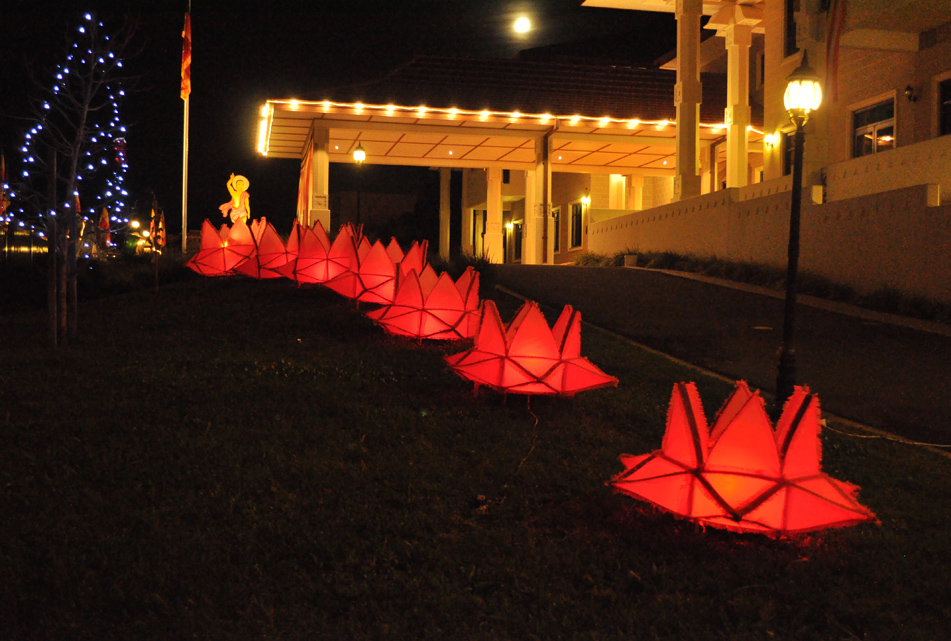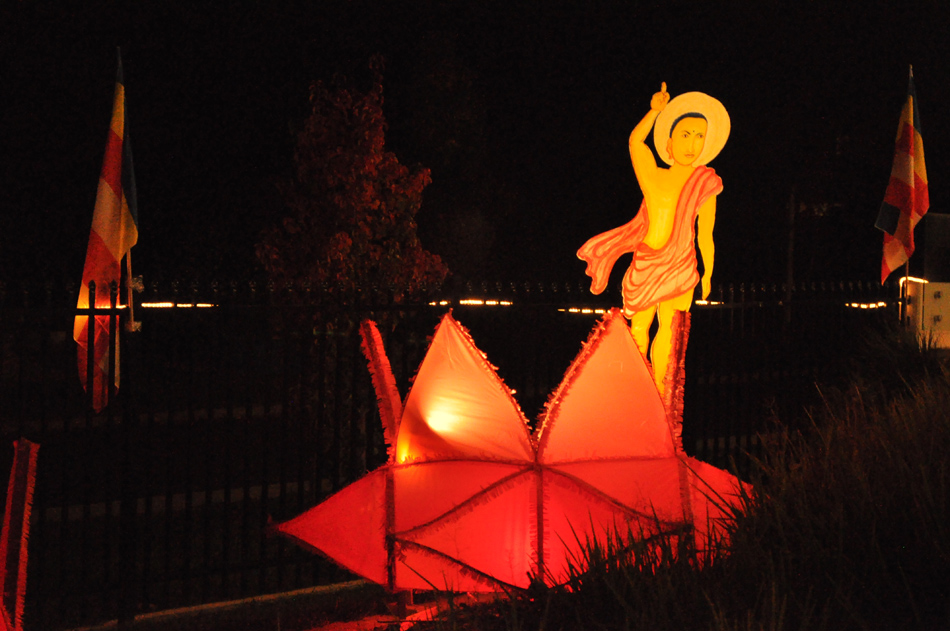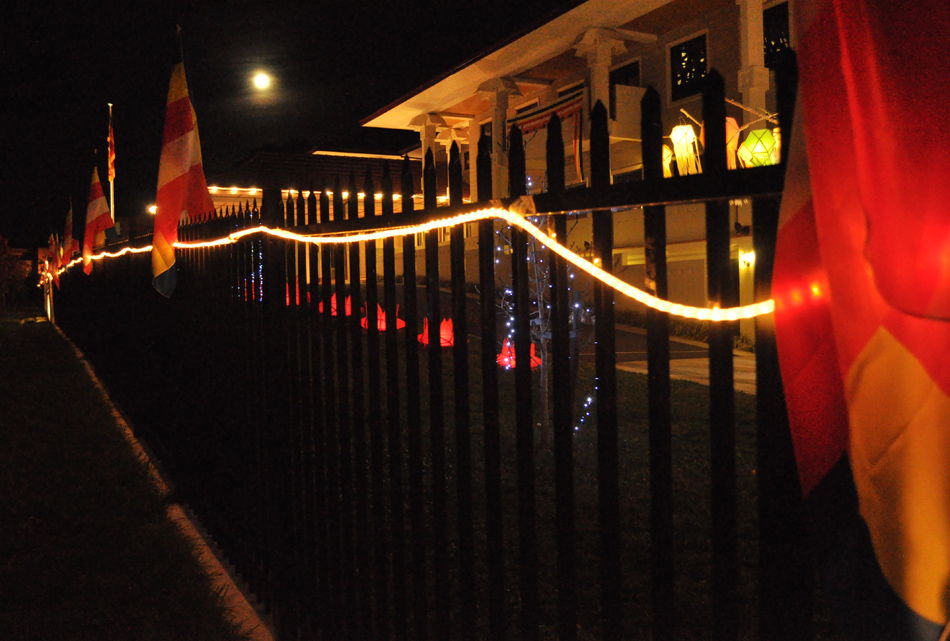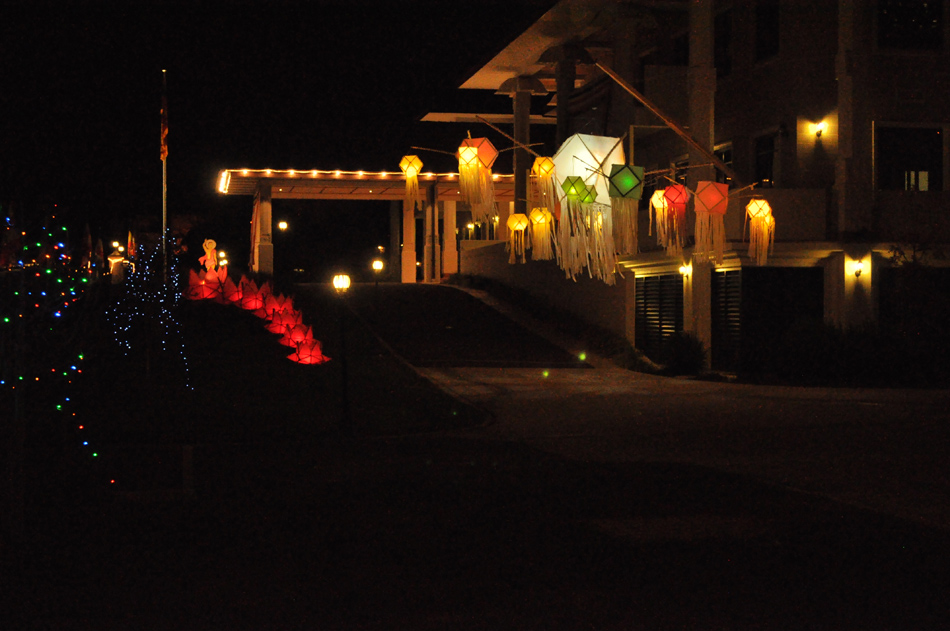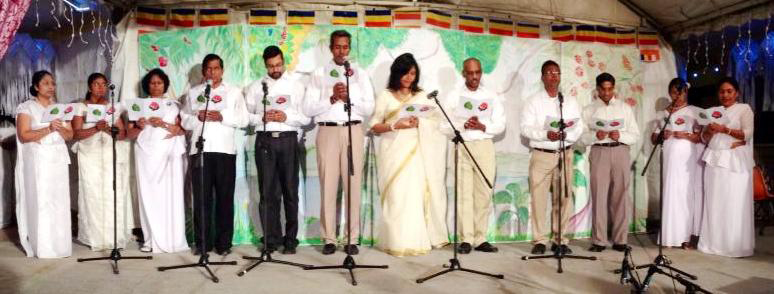


Australian Federal Parliamentarian supports Sri Lanka and rejects separatism in Sri Lanka
December 5, 2014
Hon. Don Randall, MP and Chair of the Australia/Sri Lanka Parliamentary Group made a speech at the Parliament on 3rd December 2014 supporting Sri Lanka.
Details of the Landslide in Sri Lanka on the 29th October 2014 and it’s assessment.
October 31, 2014
Budget – 2015
October 29, 2014
President Mahinda Rajapaksa presented the tenth Budget – Budget 2015 last Friday which was a development oriented Budget focussing on the needs of all citizens alike. The Budget presentation received a thundering ovation in Parliament while the people of this country were also overwhelmed with it. A salary increase of Rs 3000 upto Rs 30,000 is envisaged for those with low salaries enabling them to earn a monthly salary of Rs 30,000.
Highlights of the Budget Speech are given below.
*Preserving and protecting a free health care system is also an important priority in the Mahinda Chintana Development Framework. Our Government recruited the required specialists, medical personnel, nurses and para-medical staff, revised their emoluments and incentives, an increased expenditure for pharmaceutical drugs, ambulances, and medical equipment to develop hospital facilities. Nearly 50,000 persons were recruited to the Health Sector alone. The Government has also expanded its capacity to manufacture essential drugs in addition to encouraging local pharmaceutical manufactures to increase their production capacity so that the cost of these drugs will reduce while also saving foreign exchange. The total annual expenditure for the provision of free health services as of now is nearly Rs. 150 billion.
*The provision of fertiliser at Rs. 350 per 50 kg bag from 2006 to date for paddy and at Rs. 1,200 per 50 kg bag for other crops, popularizing the cultivation of maize, onion, potato, green beans, vegetable and fruits, as well as promoting poultry and aquaculture, processing dry – fish and engaging in small industries have helped low income people to expand their livelihood opportunities. Micro financing facilities have been expanded through Divi Neguma community banking societies and agrarian banking. The provisions in the annual Budget for Divi Neguma/ Samurdi cash allowances have been increased. Over 100,000 motorcycles have been distributed among field level officers at villages giving new recognition to government services at rural level. The Farmer?s Pension Scheme was restored and crop insurance and compensation coverage for wild life related destructions were expanded.
*The income growth and improved living standards among low income people are shown from the decline in people below poverty line. The number of people living below the National Poverty Line has declined from 15.7 percent in 2006/07 to 8.7 percent in 2012/13. Rural poverty has declined from 15.7 percent to 7.6 percent while poverty in the plantation sector has declined from 32 percent to 10.9 percent. People below US$ 2 per day income have declined from 28.3 percent to 18.9 percent. Maternal mortality has declined from 12.1 per 100,000 live births in 2004 to 7.2 in 2013. The nation has approached malaria free status.
The number of children attending primary schools has increased to 98 percent while the number attending secondary schools have increased to 84 percent. Rural unemployment has also declined from 7.8 percent to 4.5 percent. Unemployment among youth in the age group of 18-30 has declined from 15.8 percent to 13.1 percent.
*Export industries have picked up showing a 12 percent growth. The apparel industry has shown a 15 percent growth and is expected to generate US$ 5,000 million export earnings this year. Value added tea, rubber and cinnamon products have increased exports earnings to US$ 3,000 million. Software, gem and jewelry, handloom and confectionary industries have gained momentum. Export earnings are expected to generate US$. 11,500 million this year.
*Sustaining an employment level at 97 percent of the labour force remains our employment goal for 2020. Our vision is to engage students after reaching GCE Ordinary Level and Advanced Level standards, either in higher education for graduate studies or in the vocational stream of education to drive the economy making optimum use of knowledge and skills of our work force, is the overall target of our employment strategy. Maintaining youth employment at 95 percent is a special target of our employment strategy.
*A National Drug Policy has been formulated for the regulation of drug usage, clinical trials and research activities in specialized hospitals. Parallel to these developments, we propose to expand the subject areas of the Postgraduate Institute of Medicine and also to double the intake for postgraduate studies in medicine. The Post Graduate Institute of Medicine will be transformed over the next 3 years, as a state-of-the-art facility that would connect neighbouring teaching hospitals to engage in postgraduate research and advanced studies and increase medical specialists capable of treating kidney ailments, malnutrition and similar contemporary challenges faced by our society.
*The Government’s effort over the last 8 years to promote IT as a major industry is expected to raise foreign earnings to about US$ 1 billion by 2016, while creating around 100,000 well-paid employment opportunities.
Our vision is to lift Sri Lanka to be among the Top 30 IT destinations in the world over the next three years and to raise foreign earnings to US$ 5 billion and make it a major employment generation sector for youth, by 2022.
The ICT Zone at Hambantota offers facilities of global standards for IT/BPO services, to transform Sri Lanka as the emerging ICT Hub in South Asia.
*We have set our export target at US$ 20 billion in 2020. Our aim is to raise export earnings of high value tea, apparel, handlooms and rubber products to US$ 15 billion by 2020. Our vision for tea, apparel and cinnamon exports is to position Sri Lanka among the Top 10 high quality product manufacturing countries in the world by 2020. Natural rubber, cinnamon and spices while being exports capable of securing premium value, will also protect our environment and bio diversity interests in development.
We have requested the World Trade Organization to declare Ceylon Cinnamon as a specific product based on a geographical identification.
These will pass on broad based benefits of development to a majority of our people, who are predominantly smallholders. Our desire is also to promote fruits, vegetable, foliage and poultry also as exports, since our producers have developed such products to a level that meets international standards.
The promotion of pineapple, mango, papaya, banana, dragon fruit and strawberry as export earning sources, are expected to earn US$ 500 million by 2020.
*The Government is committed to gain a higher Investment Grade by reducing debt to GDP to below 60 percent, further strengthening country’s already strong macro economic environment by 2020 to consolidate country’s economic strength. In the backdrop of this direction, the overall investment to GDP is expected to rise to 40 percent. The total Gross Domestic Production is expected to exceed US$ 165 billion at a rate of around 13 percent growth.
Taking the process of transforming the economy from a less developed economy with a per capita income of less than US$ 1,200 prior to 2005 to a US$ 4,000 per capita economy by 2015 – moving further forward we plan to surpass US$ 7,500 per capita income for our people, as a high middle income country is our national income goal by 2020.
*With all these measures that have been taken, the Budget deficit has been reduced to 5 percent of GDP in 2014 and will target 4.6 percent in 2015. We are determined to raise a surplus in the revenue account gradually towards 2.5 percent of GDP and bring down the Budget deficit to 3.8 percent by 2016 and 3 percent by 2017, underscoring our commitment to limit borrowings only for capital formation and not for consumption. We will reduce the Debt /GDP ratio to 65 percent.
We have paid back almost half of IMF debt of US$ 2.5 billion, which we obtained through a Stand By Arrangement in 2009 to stabilize our economy. We will provide a strong National Budget that is capable of servicing all such debt of our country promptly, to maintain the creditworthiness of our nation.
*The Government revenue in 2015 is likely to be around Rs. 1,600 billion and current expenditure will be around Rs. 1,400 billion.
This will secure payment of salaries, pensions, the fertilizer subsidy, for pharmaceutical drugs, welfare expenditure and interest cost of debt. Further, the Budget will maintain public investments of Rs. 730 billion to expand infrastructure, human resources development and economic activities.
*I propose to fix the maximum PAYE tax rate at 16 percent to ease the burden of wage earning employees and professionals. It is proposed to reduce the Value Added Tax to 11 percent.
*The Inland Revenue Department is being computerized to link all relevant agencies to improve tax administration and to enable the use of a Personnel Identification Number to co-ordinate all transactions. I am pleased to announce that with effect from tomorrow the Inland Revenue and Customs will go online to simplify income tax registration and export and import transaction related payments.
*The Central Bank manages the Employees Provident Fund, which has an asset base of Rs. 1 trillion. Central Bank in recent years has invested about 10 percent of its assets in income earning commercial assets, which has gained capital appreciation of around Rs. 10 billion this year.
I therefore propose to distribute dividend to members of Provident Fund who has over 10 years of active accounts.
This is the first ever dividend distribution by the EPF and I see this as a special benefit to members.
In addition, the Fund has got stronger to pay all members of the fund an interest income in excess of 10 percent each year.
*As maternity care should be given special attention, I propose to allocate Rs. 1,500 million to develop Karapitiya, Colombo, Kandy and Anuradapura maternity hospitals as super centers in maternity care and develop Badulla and Beliatta hospitals as maternity and child care specialized centers. Steps have also been taken to accelerate the modernization of the two national children’s hospitals as centers of excellence capable of providing the next 10 year pediatric care needs of our country as well as medical research on pediatric care. The OPD treatment and ancillary facilities of the Colombo National Hospital expanding its outdoor patient care capacity, will be completed by 2017.
*I propose to allocate Rs. 500 million to implement accelerated medical examinations of all citizens through mobile medical clinics and expand testing related facilities to strengthen preventive health care. I seek the support of all religious places of worship to give leadership in organizing such clinics in each Grama Niladari division. I propose to commence a mobile ambulance service in all main hospitals through the National Insurance Trust Fund to provide emergency care at their doorsteps to persons who fall ill suddenly, to be taken to hospital safely.
*I propose to allocate Rs. 500 million for the rehabilitation of Ayurvedic Hospitals and promotion indigenous medical research. I also propose to grant a monthly allowance of Rs. 5,000 for indigenous medical doctors who serve in government Ayurvedic Hospitals. I propose to implement a loan scheme for indigenous medical practitioners be able to draw upto Rs.500,000 at 6 percent interest, to improve their dispensaries and to process required medicinal treatment.
*In order to incentivise vocational education, I propose to implement a new student scholarship scheme for 50,000 students per year from low income families who pass ordinary level and advance level examinations but are unable to enter universities or other advance institutes for further studies. Each student will be given a Rs. 3,000 monthly student allowance. This scheme will bring about Diploma and Certificate holders above level V of the National Vocational Qualification, in employable fields.
I also propose to increase the number of student scholarships to 50,000 per year and grant a student allowance of Rs. 3,000 per month to those studying at technical university colleges.
*As part of broadening horizons of our higher education, I propose to set up a school of Economics and Development Engineering that offers arts, commerce and science students qualifying from GCE A/L exam to learn multi disciplinary subjects such as economics, law, engineering, science and mathematics being subject options in a single degree.
Further, I propose to allocate Rs. 500 million for research on cancer by the Colombo University, on kidney diceases by the Peradeniya and Rajarata universities and on diabetics by the Ruhuna University and another Rs. 500 million to the National Research Council for research on other fields.
*I propose to allocate Rs. 500 million for the provision of nutritious food for children, to improve nutritional standards of mothers and children by engaging nutritional specialists in each district and to carry out community level mobile clinics to distribute Threeposha and Samaposha nutrition supplements to all lactating and pregnant mothers and for the provision of meals to children attending pre schools. The Divi Neguma/Samurdi programs are directed to popularise consumption of homegrown vegetables, milk and eggs towards improving nutrition.
I promoting breast feeding through these initiatives. I also propose to give infant milk food at concessional prices through Lanka Sathosa outlets. Since infant milk food is totally free from taxes, I request all super markets and traders to reduce the price of infant milk food.
*I propose to grant dual citizenship or 5 year work visas to young Sri Lankans living abroad and do not have a Resident Visa to that permits them to serve their motherland.
I also propose to grant concessionary duty permits similar to those given to public servants to high income earning Sri Lankans working overseas for the importation of a motor vehicle to the value of 60 percent of foreign exchange they remit to Sri Lankan banks.
* To ease the burden of small land owners speccialy in urban areas in having to pay a heavy lease rentals to the State, I propose to exempt those earning less than Rs. 25,000 per month or Rs. 300,000 per year from having to pay any such lease rentals. Further, I propose that introduce a sliding scale ranging from 0.5 percent to 4 percent for each income slabs of Rs. 100,000 in excess of Rs. 300,000. The 4 per cent slab will only if the income is in excess of Rs. 600,000 per year.
* I propose to provide lands on long term leases to set up 300 factories in every divisional secretary area in the background of improved prospects for export and import competing industries. Provisions will be made to permit lump sum depreciation for the importation of plant and machinery in addition to exempting them from dividend tax and providing a half tax holiday for a period of 3 years.
I also propose to provide modern machinery and equipment for small and medium handloom industries to expand this industry to cater global markets. Investors undertaking new investments in excess of Rs. 500 million will be given a 7 year half tax holiday provided such investments are registered with the Inland Revenue Department before end of 2015.
* I propose to increase the Rs.1,000 allowance granted to elderly people to Rs. 2,000 from January 2015. Elderly clubs will be set up in all Grama Niladari areas to create an enabling environment for elderly people to spend their leisure time watching TV, reading and being engaged in other facilities available at day centers. Medical clinics will also be organized at these centers. An accelerated program will be carried out to ensure eye care as well as primary health care of the elderly. I also propose to allocate Rs. 250 million to provide financial assistance to reputed social organizations, which promote elderly care in our society. Rs. 200 million will be allocated to rehabilitate elderly homes at Saliyapura, Katharagama, Mirigama and Jaffna. I also propose to allocate Rs.100 million to provide financial grants to film producers and artists to make films and teledrams promoting success stories of traditional family values towards elders.
* The coordinated effort of Sri Lanka Women?s Bureau, Child Protection Authority and Sri Lanka Police have reduced child abuse and violence against women, considerably.
I propose to allocate Rs.300 million to strengthen field level officers at Divisional Secretariats to expand awareness programs in schools through parents – teachers associations, Divi Neguma community based organizations and to engage retired public servants in family counseling.
* The new Pay Commission, which I appointed last year, has recommended some changes to the salary structure introduced in 2006.
Therefore, I propose to introduce a new pay structure with effect from January 2015. Accordingly, the special allowance given to public servants will be absorbed to the salary structure and raise the minimum salary to Rs. 15,000 per month. I propose to maintain a salary ratio of 1: 4.25 between minor employees and Secretaries to accommodate higher annual increments. I also propose to raise the Cost of Living Allowance by Rs. 2,200 to Rs. 10,000 per month from January 2015 to all public servants. Accordingly, the minimum monthly income of a public servant will increase to Rs. 25,000.
*The new salary structure, allowances and other salary related benefits will provide public servants a pay increase of Rs.3,500 to 15,000 per month from January 2015 with a minimum monthly income of Rs. 30,000 to lowest rank employees. I also propose to allow public servants to borrow up to 40 percent from of their gross salary, including all allowances. Grade 5 and Mahapola Scholarships will be extended to children of public servants as well.
All public servants will be given a bank card with a credit limit of Rs. 10,000 on interest free basis to be paid in 10 installments, to meet festival advances. This credit facility will be guarantee by the National Insurance Trust Fund. I also propose to increase the insurance coverage under Agrahara Scheme for surgical operations from Rs. 350,000 to Rs. 500,000.
* I propose to place pensioners’ salaries not on the 2006 salary structure as was requested by all pensioners but on the proposed 2015 salary structure to once and for all correct the inherent anomalies affecting pensioners when salaries of public servants are revised.All pension payments will be adjusted in accordance with the 2015 new salary structure and hence there will be no pension anomalies hereafter.
* Therefore, I propose to raise the minimum wage of the private sector employees to Rs. 10,000 per month from January 2015 and to increase all minimum wages above that threshold at least by Rs. 500 per month.
As new sectors have been emerged in the economy, I propose to extend Minimum Wage Boards to those sectors within a rational economic cluster arrangement.
I also propose to increase the employer contribution to EPF by 2 percent to 14 percent so that each employee will have 22 percent savings from their salaries.
Courtesy: The Sunday Observer. Sunday, 26th October 2014.
Deepavali Celebrated in Sri Lanka High Commission Australia
October 28, 2014
The High Commission of Sri Lanka in Canberra, Australia celebrated the Deepavali, “The festival of Lights” at the High Commission on 25th October 2014. A cross- section of the Sri Lankan Tamil community resident in Canberra, the representatives of the Sri Lankan Associations were present at the event.
The celebrations were held in maintaining the tradition of multiculturalism in Sri Lanka.
The Chief Priest of the Vishnu Shiva Mandir Shri Pradeep Bhat and the visiting Priest Shri Krishnamoorthy Bhat conducted the religious observances with an invocation prayer and offered blessings to His Excellency Mahinda Rajapaksa, the President of Sri Lanka, people of Sri Lanka and Australia and also prayed for harmony among all communities. High Commissioner Admiral Thisara Samarasinghe whilst welcoming the audience stressed the significance of religious tolerance and co-existence in Sri Lanka which should pave the way for reconciliation and better understanding. He further stressed the importance of teachings for our respective religions to the younger generations for guidance towards a peaceful society in the future.
Mrs. Paromita Dey sang a number of devotional songs along with an outstanding violin performance by Mrs. Prathiba Nagapushan accompanied on the Tabla by Mr.Sukumar Subramaniam and Miruthangam by Mr. Saravanan Kandasamy. The students of Dr. Shibani Mishra, ODISSI Dance Academy presented a splendid ODISSI dance and the students of Mrs. Bhagya Palihawadana, Sri Lanka Dancing School performed a beautiful Sri Lankan dance.
Mr. Thamo Sritharan, Vice- President of the Vishnu Shiva Mandir delivered a speech on the significance of Deepavali, quoting the essence of all religions and emphasising the guidance for the human beings to start new to live peacefully in this materialistic world.
Mr. Periyasamy Pillai Selvaraj, Minister of this Mission delivered the Vote of Thanks.
Following the religious and cultural functions, refreshments were served, which included an array of traditional Hindu Foods, for all participants.
Address by H.E. Mahinda Rajapaksa President of the Democratic Socialist Republic of Sri Lanka at the 69th Session of the United Nations General Assembly New York, 24th September 2014
September 27, 2014
Mr. President,
Secretary General of the United Nations,
Your Majesties
Excellencies,
Ladies & Gentlemen,
I congratulate Your Excellency Sam Kutesa on being elected as the President of the 69th Session of the United Nations General Assembly. We wish you success and assure you of our fullest cooperation.
The theme for this Session, “Delivering on and Implementing a Transformative Post-2015 Development Agenda”, is timely. The world has undergone many changes since the UN was created, and since the year 2000, much progress has been made towards achieving the Millennium Development Goals.
However, there are multiple challenges that still remain to be addressed. The moral and practical importance of creating an equitable world and a sustainable planet for this purpose cannot be ignored.
Mr. President,
The Commonwealth, of which Sri Lanka is the current Chair in Office, accounts for over one quarter of the UN membership. In November 2013, the Commonwealth Heads of Government agreed in Colombo, to contribute to the process of evolving the new post-2015 global development agenda. They have endorsed the central focus on the eradication of extreme poverty and reaffirmed commitment to sustainable development.
The perspective on the post-2015 development agenda is based on shared values and principles contained in the Commonwealth Charter and individual experiences. The Commonwealth leaders encourage others to approach the forthcoming inter-governmental negotiations, in a collaborative spirit to achieve a balanced post-2015 development agenda.
Mr. President,
Reducing inequality within and among countries is one of the most transformative goals that have been proposed by the Working Group on Sustainable Development Goals. We hope that this goal will serve to enhance the voice and representation of developing countries in decision-making.
The post-2015 agenda must focus on implementation. Achieving the SDGs would be impossible without the political will and dedication of all countries. It must be ensured that the failure of the developed countries to fulfil Millennium Goal 8 that called for a global partnership for development is not repeated.
In determining goals, countries must not be deprived of policy space, to set their own domestic priorities. Instead of asking countries to reprioritise domestic spending, there should be focus on a strengthened partnership between developed and developing countries, backed by sincere commitment. This is essential for countries in the South to access financial resources and technology that are essential for capacity building.
It is vital that we also address structural obstacles and political barriers that prevented the realisation of the MDGs, such as unfair trade and investment rules. Creating a supportive international economic environment, enhanced investment flows, including from multilateral development banks, and an open multilateral trading regime, are important.
Mr President,
We all know the historical context in which the United Nations was created after two world wars. During the seven decades of its existence, the world has been saved from plunging into another global war. The UN has helped to improve standards of living, eradicate disease, educate children, and in peacekeeping. Year after year in September, the world community comes together to reaffirm the founding vision of this institution.
The role of the UN in advancing international peace, security and prosperity is crucial in the contemporary world. However, in order to gain the confidence and goodwill of the international community as a whole, one of the essential requirements is consistency of standards across the board without any perception of selectivity or discrimination. It is in this context that the current functioning of the system needs examination in order to enhance its credibility.
Human rights are used as a tool to implement motivated agendas with no understanding or appreciation of the complexity of issues in the countries concerned. Human rights should be recognised by all as a moral and ethical concept rather than as a political tool. External intervention without adequate consideration of the structures in a society and cultural traditions of the countries where such intervention takes place, inevitably results in destabilisation, which is very much in evidence today, in most parts of the world.
Mr. President,
Post-conflict Sri Lanka has also become an unfortunate victim of ill-conceived agendas of some in the Human Rights Council, who pay scant regard to the substantial progress achieved by Sri Lanka, in reconstruction, rehabilitation and reconciliation within a short span of 5 years. There is an obvious lack of balance and proportion in the manner in which my country is being targeted today, disregarding these significant achievements. This is in sharp contrast with the approach to deeply disturbing situations involving humanitarian emergencies elsewhere.
Mr. President,
For multilateralism to remain relevant and effective, reform of institutions concerned is essential. To be successful, this process must involve de-politicisation of the UN systems and mechanisms and they must stop being hostage to different forms of funding. UN bodies must find ways to work with governments through dialogue, greater understanding of situations and cooperation including assistance to strengthen national institutions. This approach, instead of strong arm tactics, must form the heart of multilateral diplomacy, in the search for sustainable solutions to global challenges.
Mr. President,
The 70th year of the UN in 2015 also marks the 10th anniversary of the 2005 World Summit where global leaders agreed to support early reform of the Security Council. Concrete results in this regard, should be achieved next year.
Mr. President,
Climate Change is one of the defining challenges of our times. A robust global response needs to be arrived at, in 2015, on the basis of equity and the principle of common, but differentiated responsibilities.
Mr. President,
The increase of violence in the Middle East is deeply distressing. I reiterate Sri Lanka’s support for the early realisation of a sovereign, independent, viable and united State of Palestine, existing within secure and recognised borders, side-by-side and at peace with Israel. We look forward to welcoming Palestine as a full member of the UN at the earliest. The international community must assist Palestine to rebuild their country.
Sri Lanka firmly believes in the need for solidarity between Asia and Africa. Admiring the efforts of the people of Africa to achieve socio-economic development, Sri Lanka has begun a process of reaching out to countries in Africa, for exchange of knowledge and expertise in areas of importance. The international community must strongly support the early eradication of deadly diseases in Africa.
Mr. President,
Sri Lanka remains committed to supporting all multilateral efforts to counter terrorism deriving from extreme ideologies impacting on people across national frontiers.
Terrorism continues to be a grave threat to security and stability of nations across the globe. Having suffered at the hands of terrorism, Sri Lanka knows well, its drastic impact on societies, communities and institutions founded on democratic traditions and ideals. The international community must strengthen multilateral action on terrorism including the early finalisation and adoption of the UN Comprehensive Convention on International Terrorism. Sri Lanka is also committed to support all multilateral efforts to counter, terrorism financing, piracy, and all forms of international organised crime. We wish to recall our appeal to the international community not to support terrorist groups in any way, either direct or indirect.
Mr. President,
Sri Lanka expresses deep concern regarding unilateral economic measures against developing countries and is a consistent supporter of the call of the UN General Assembly for an end to the unjust economic, commercial and financial embargo against Cuba. Unilateral sanctions of this nature, which impact a country’s innocent population are unethical.
Mr. President,
Despite being affected by terrorism Sri Lanka has achieved most MDGs. Sri Lanka has succeeded in being ranked ahead of all South Asian countries in the 2013 Human Development Index.
Through the adoption of the National Development Strategy, the Mahinda Chinthana, ‘Vision for the Future’, the Government of Sri Lanka embarked on an inclusive and rural-centric development programme. This involved bold policy decisions connected with macro-economic management, revitalisation of agriculture, infrastructure development including road and expressways, ports and airport, irrigation and water distribution, a strong telecommunication network and well distributed urban and township development resulting in 7.8 percent GDP growth and per capita income of US$3,280 in 2013.It is also a matter of deep satisfaction to recognise that the economic and political empowerment of the people of the North supported by massive investment in infrastructure and livelihoods have also contributed to this growth.
Sri Lanka’s IT literacy grew steadily from a mere 3 percent in 2005 to almost 50 percent in 2014. Sri Lanka’s Nenasala programme was awarded the prestigious Bill & Melinda Gates Foundation Award as the best rural IT access programme in the world.
With the end of terrorism in May 2009, in keeping with my responsibilities to my people, large-scale post-conflict reconstruction, rehabilitation and resettlement initiatives were implemented in the North in a relatively short period of 4 years. Most importantly, democratic structures in the North have been re-established. Elections were held to the Northern Provincial Council in September 2013, after a lapse of 28 years upholding the democratic tradition in Sri Lanka which has been consistently protected since 1931, the year we attained universal franchise.
I recall in this context, the visit of the UN Secretary-General, to Sri Lanka, just a week after the conclusion of the conflict when a new era of peace had dawned. This was a manifestation of the close cooperation between my country and the UN and our commitment to work together in the future.
It is significant that this year we hosted the World Conference on Youth in Sri Lanka and since peace was restored in 2009, we have had a large number of international conferences and gatherings, thus making our country a venue for international events, all due to the peace that was ushered in.
Mr. President,
We continue on a deeply satisfying and a transformative journey in the interest of all the people of Sri Lanka. In carrying out this task, we work in accordance with our traditional foreign policy of friendship towards all and enmity towards none. We hope that the international community will reciprocate and assist Sri Lanka in her domestic process of reconciliation and economic development without exerting undue pressure on us.
We have gained inspiration from the words of Gautama the Buddha who said that the purpose of all human endeavour must be to construct order out of chaos and harmony out of strife. True to these words of wisdom, the Government of Sri Lanka remains committed to its objective of pursuing the processes of reconciliation, and nation building, undeterred by ill-motivated criticism.
Thank you.
May the Triple Gem Bless you all.
SKY News Interview with Sri Lanka High Commissioner Admiral Thisara Samarasinghe
July 4, 2014
AGENDA Sri Lanka denies abuse claims
Link to the above – http://www.skynews.com.au/video/program_agenda/2014/07/03/agenda-sri-lanka-denies-abuse-claims-.html
Tony Abbott praises Sri Lanka’s human rights progress amid speculation Tamil asylum seekers were handed over to country’s navy
July 4, 2014
Immigration correspondent
“We are breaching our central obligation under the refugee convention” says lawyer Julian Burnside, after two boatloads of asylum seekers were allegedly screened and handed over to the Sri Lankan navy by Australia.
PT1M44S http://www.smh.com.au/action/externalEmbeddedPlayer?id=d-3ba34 620 349 July 4, 2014 – 7:31AM
Prime Minister Tony Abbott has described Sri Lanka as a ”society at peace”, amid mounting speculation that two boats carrying Tamil asylum seekers have been handed over to the Sri Lankan navy in the middle of the ocean.
Speaking to 3AW on Thursday morning, Mr Abbott said it was no secret that Australia was turning back boats on the high seas.
Prime Minister Tony Abbott has praised Sri Lanka’s progress on human rights amid mounting speculation Tamil asylum seekers will be handed over to the country. Photo: Ken Irwin
”We said before the election that one of the policy options that we reserve the right to use, were it safe to do so, is turning boats around,” he said.
Advertisement
On Wednesday, Fairfax Media revealed that 50 Sri Lankan asylum on board one boat were asked four basic questions by immigration officials via a teleconference, as part of a screening process. It is understood the asylum seekers are likely to be handed over to the Sri Lankan navy.
The questions asked included the passengers’ name, country of origin, where they had come from and why they had left.
Another asylum seeker boat, which held 153 passengers who were also Sri Lankan Tamils, has since been transferred to a navy boat, after civilians lost contact with the boat on Saturday morning.
When asked whether the government was sending asylum seekers back to the country they fled from, Mr Abbott replied: ”There does need to be a process because we do have international obligations so there does need to be a process.
”But I want to make this observation, Sri Lanka is not everyone’s idea of the ideal society but it is at peace . . . a horrific civil war has ended. I believe that there has been a lot of progress when it comes to human rights and the rule of law in Sri Lanka.”
Immigration Minister Scott Morrison has refused to comment on the two boats – one carrying 153 asylum seekers and the other carrying 50 asylum seekers – maintaining that the government does not comment on ”speculation or reporting” regarding on water operations.
Labor’s immigration spokesman Richard Marles, who has so far kept a low profile on the issue, said it would be a disgrace if asylum seekers were handed over to Sri Lanka, and demanded the government come clean with the Australian people.
”They have a right to know and this minister is treating everyone with contempt in denying us the right to know,” he told Sky News on Thursday.
Asked later on Thursday if Australians had a right to know what was happening with asylum seekers on the two boats, Mr Abbott said: ”The public deserve safe and secure borders.”
”They deserve a country that has not become open for the wrong kind of business, the people smuggling business,” he told reporters in Melbourne.
“Everything we do is consistent with safety at sea and everything we do is consistent with our international obligations.
“It is a peaceful country. It is a peaceful country. I don’t say it’s a perfect country, not even Australia is that. But it is a peaceful country and all of us should be grateful that the horrific civil war is well and truly over and that is to the benefit of every single Sri Lankan, Tamil, Sinhalese. Everyone in Sri Lanka is infinitely better off as a result of the cessation of the war.”
Despite Mr Abbott maintaining that Sri Lanka is now a society of peace, advice from the Department of Foreign Affairs and Trade says Australians should exercise a ”high degree of caution” due to the ”unpredictable security environment” in the country.
”You should avoid all demonstrations and large public gatherings as they may turn violent or be a target for politically-motivated attacks. Police have used tear gas in response to protests,” the advice on the department’s website says.
”In the Northern Province of Sri Lanka, which includes Mannar, Vavuniya, Mullaitivu, Kilinochichi and Jaffna Districts, post-conflict security force activity is ongoing.”
Greens leader Christine Milne said if the transfers with the Sri Lankan navy go ahead, it would the first example of the Abbott government sending people directly back to where they have been persecuted.
”The Prime Minister must explain to Australians how he can claim that what he is doing is not a human rights abuse,” she said. ”How can he claim what he is doing is not a contravention of the convention when he is engaged in total secrecy?
”It is absolutely wrong for Australia to return people seeking asylum to the countries in which they were being persecuted. It is wrong. It is shameful.”
According to a member of the co-ordinating committee of the Gummudipoondi camp for Tamil refugees, who were on board the boat carrying 153 asylum seekers, in the Indian state of Tamil Nadu, members of the Tamil Nadu police force’s “Q” branch, which monitors the activities over refugee camps, had swept his camp and several others seeking information.
“They have been here asking, investigating, looking for the information,” said the coordinating committee member who gave his name as William.
William said there were 17 people missing from his camp who are assumed to be aboard the vessel and that he had been in contact with the families over the past few days.
“They are extremely worried, crying, desperate for information about what has happened, pleading for some country to accept them so they do not be made to return to Sri Lanka,” he said.
“They believe that if the refugees are made to return to Sri Lanka they will face severe harassment, possibly even torture, from the local authorities in Sri Lanka. Of course there is a lot of concern.”
with Jason Koutsoukis
President Rajapaksa highlights importance of sovereignty and territorial integrity of nations to build peace and security
May 29, 2014
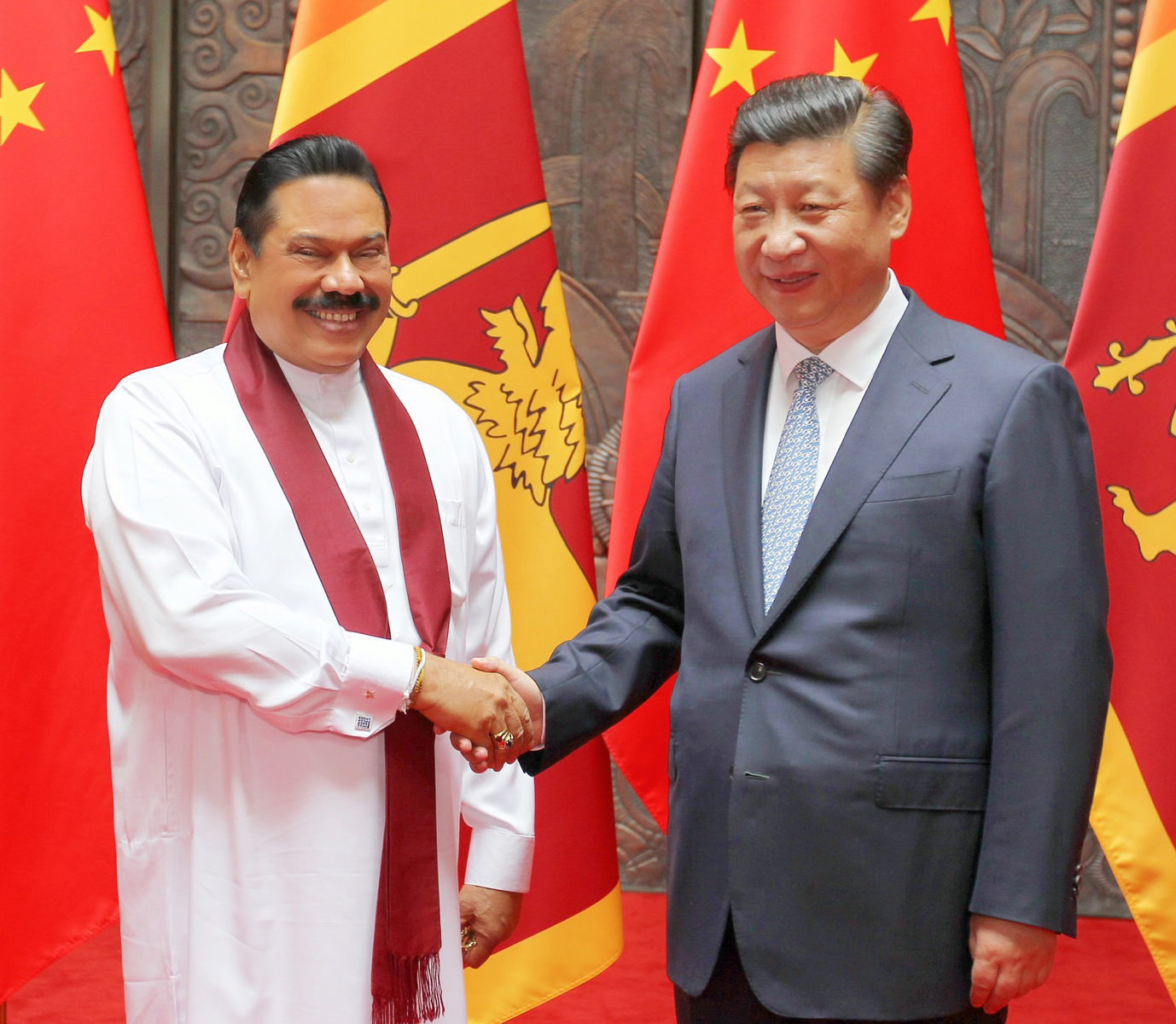
Chinese President Xi Jinping receiving President Mahinda Rajapaksa for official talks on 22nd May 2014 at Xijiao State Guest House in Shanghai.
President Mahinda Rajapaksa, participating at the 4th Summit of Heads of State & Government of the Conference on Interaction and Confidence Building Measures in Asia (CICA) at the invitation of President Xi Jinping of China, stated that “for building peace and stability in a region, it is imperative that the sovereignty and territorial integrity of our nations are secure.” This fundamental right of States is being violated. “With self-interests at the core, some external entities, using the guise of democracy, have sought to interfere in the domestic affairs of countries, resulting in de-stabilizing these nations and thereby even those regions.”
CICA is a multinational forum for enhancing cooperation towards promoting peace, security and stability in Asia and is based on the recognition that there is a close link between peace, security and stability in Asia and in the rest of the world. Presently, CICA has 24 Member States. 09 countries and 04 multinational organizations have Observer status. Sri Lanka became an Observer State of CICA in 2013.
The 4th CICA Summit was held in Shanghai, China from 20 – 21 May 2014 and China took over the Chairmanship from Turkey for the period 2014 to 2016.
President Rajapaksa, speaking further said that it is “indeed appropriate that Asia takes the lead in the settlement of any Asian affair, and CICA as a multilateral mechanism on security in Asia, should seek to engage appropriately on the proposals made by His Excellency the President of China towards this end.”
On the sidelines of the CICA Summit, President Rajapaksa held bilateral talks with his Chinese counterpart President Xi Jinping. Having discussed an array of bilateral issues, both sides agreed to maintain high level exchanges, fast-track the launch of the Sri Lanka – China FTA negotiations, expand development assistance and investment, cooperate in the implementation of the Maritime Silk Route, associate with the Asian Infrastructure Investment Bank project and expand people to people exchanges between the two countries. President Xi Jinping appreciated and accepted the invitation extended by President Rajapaksa to visit Sri Lanka in the near future.
President Rajapaksa also held bilateral talks with President Mamnoon Hussain of Pakistan, President Hassan Rouhani of Iran and the UN Secretary General, Ban ki-Moon.
President Mahinda Rajapaksa was accompanied by the Minister of External Affairs, Prof. G.L. Peiris; Chief of Staff to the President, Gamini Senarath; Secretary to the Ministry of External Affairs, Kshenuka Senewiratne, Sri Lanka’s Ambassador to China Ranjith Uyangoda, the Consul General of Sri Lanka in Shanghai and senior officials of the Presidential Secretariat, Ministry of External Affairs of Sri Lanka and the Embassy of Sri Lanka in Beijing.
Embassy of Sri Lanka
Beijing
24 May 2014
Prime Minister of Solomon Island greatly values gesture of assistance and solidarity by the President of Sri Lanka
May 27, 2014
His Excellency Mahinda Rajapaksa, President of the Democratic Socialist Republic of Sri Lanka has sanctioned a cash contribution of US $ 50,000.00 from the Government and people of Sri Lanka to the Government and people of the Solomon Islands as a gesture of solidarity and assistance. This was in support of the rehabilitation, resettlement and reconstruction programmes underway in Solomon Island after the last month’s devastating cyclone and flood water damages.
Therefore, on the directive of the Minister of External Affairs Hon. Prof G.L. Peiris, the High Commissioner of the Democratic Socialist Republic of Sri Lanka in Canberra, Australia Admiral Thisara Samarasinghe, who is also accredited to Solomon Islands visited to Solomon Islands on 22nd May 2014 and called on His Excellency Gordon Darcy Lilo, Prime Minister of Solomon Islands and handed over a letter from His Excellency Mahinda Rajapaksa, President of the Democratic Socialist Republic of Sri Lanka and also handed over a bank draft of USD 50,000.00 to Hon. Connelly Sandakabatu, Minister for Development Planning and Aid Coordination.
The meeting with His Excellency Gordon Darcy Lilo, Prime Minister of Solomon Islands and Hon. Connelly Sandakabatu. Minister for Development Planning and Aid Coordination was also attended by Mr. Robert Iroga, Chief of Staff of the Prime Minister and Mr. Ranjith Hewagama, Hony Consul designate in Solomon Islands.
His Excellency the Prime Minister of Solomon Islands conveyed his profound gratitude for the donation and appreciated the gesture of His Excellency Mahinda Rajapaksa to support the people of Solomon Islands in this hour of need. H E the Prime Minister assured the High Commissioner that the invaluable funds donated by the Government of Sri Lanka would be gainfully utilized in providing immediate challenges of shelter, food and sanitation. Prime Minister also recalled his memorable time in Sri Lanka during the CHOGM 2013 and once again congratulated the President and the Government of Sri Lanka for the rare achievement. .
H E the Prime Minister conveyed his best wishes to His Excellency the President and the people of Sri Lanka and emphasized the valuable and strong friendship that exist between the two countries and encouraged to further enhance the existing good relations.
High Commissioner also called on the Minister of Foreign Affairs, Hon, Clay F Soalaoi and the Secretary/Foreign Affairs Mr Beraki Jino who also very appreciative of the kind gesture of the cash donation.
High Commission of Sri Lanka
Canberra
Vesak Celebration in Canberra
May 22, 2014
Vesak Themagul, at the Sri Lanka High Commission in Canberra was celebrated from 14th to 18th May 2014 in a colourful manner dressing the High Commission building with large number of Buddhist flags, lights, lanterns. Decorations were on display till the 5th Ranaviru memorial Pinkama which fell on 18th of May.
The (Petaw Kooduwa) a lantern inclusive of 20 sub lanterns rooting out of mother lantern, with changing colour reflections was the one main item of decorations. It was hung over as to be sighted from far away. Seven blossoming red lotus, with a creation of Prince Siddhartha revealing his first words at birth on the last lotus was the other main attraction. Another single lantern represented blossoming flower. Surrounding fence and the building around were covered with Buddhist flags and illuminated with bulb lines.
The Australian and Sri Lankan viewers were treated with a Dansala of tea, coffee and snack for two days. Many viewers notably Australians, inquired about the reason for the function and were keen to know the meaning of this different lighting. They admired thankfully about the beauty of Vesak decoration at the Mission.
All decorations were the creations of the High Commission staff.
The High Commission staff also participated in Vesak devotional songs (Bakhthi Gee) at the Canberra Buddhist temple which was highly appreciated by the large gathering for Vesak celebration.
High Commission of Sri Lanka
Canberra
20th May 2014
Register with the High Commission
The Sri Lankan High Commission in Canberra would like to keep in touch with Sri Lankans and persons of Sri Lankan origin living in Australia, New Zealand, Fiji, Papua New Guinea, Vanuatu and other Pacific Islands as well as Sri Lankan community organisations in those countries.
If you are a current/former Sri Lankan or an office bearer of a Sri Lankan community organisation we invite you to register with the High Commission.
RegisterAddress
Sri Lanka High Commission
61, Hampton Circuit
Yarralumla
ACT 2600

